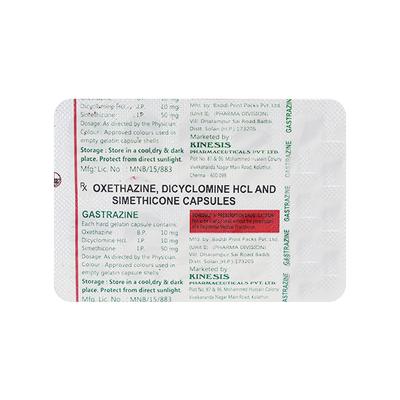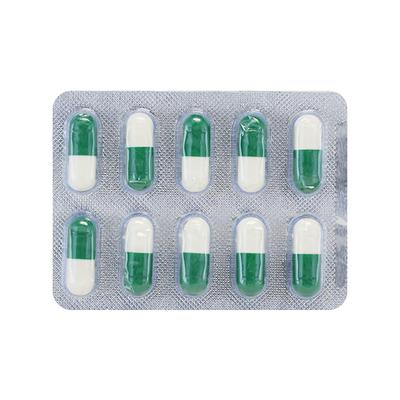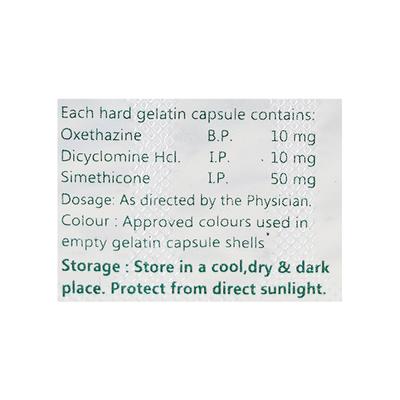

Netmeds First Membership
Quick Links
Introduction About GASTRAZINE CAPSULE
GASTRAZINE CAPSULE contains Dicyclomine, Oxethazine, and Simethicone which belong to the group of medicines called antispasmodics, anaesthetics, and gastrointestinal agents (antifoaming agents) respectively. It is used in children and adults for the management of irritable bowel syndrome. Irritable bowel syndrome is a disorder of the large intestine with symptoms of stomach pain, muscle pain, excess gas, bloating, constipation, loose motion, etc. GASTRAZINE CAPSULE is also used to manage heartburn and acidity.
GASTRAZINE CAPSULE is not recommended for patients with myasthenia gravis (an autoimmune disease with muscle weakness), glaucoma, intestinal obstruction, gastrointestinal tract obstruction, blocked urine output (obstructive uropathy), severe ulcerative colitis (inflammation and ulcer in the digestive tract), food from the stomach entering back into the oesophagus (reflux oesophagitis), unstable cardiovascular status due to blood loss, etc.
Before taking GASTRAZINE CAPSULE, inform your doctor if you have a fever, liver and kidney diseases, an abnormal heart rate, increased thyroid hormones, an enlarged prostate, a digestive problem, or heartburn caused by a ‘hiatus hernia’ (a condition in which part of your stomach pushes through the diaphragm).
GASTRAZINE CAPSULE should be used with caution by pregnant women if recommended by your doctor. GASTRAZINE CAPSULE is not recommended for use by breastfeeding women or children below 6 months of age. The most common side effects of taking GASTRAZINE CAPSULE involve dizziness, dry mouth, weakness, vision disturbances, nausea, muscle pain, an increased tendency to sleep, a lack of energy, etc. Consult your doctor if any of the symptoms are worsening.
Uses Of GASTRAZINE CAPSULE
It is used in adults and children to relieve symptoms of inflammatory bowel disease (inflammation of the large intestine) such as:
- stomach pain
- pain in the gut
- hyperacidity
- heartburn
- excessive gas
- bloating
- constipation or loose motion
- burping
How GASTRAZINE CAPSULE Works
GASTRAZINE CAPSULE contains dicyclomine, oxethazine, and simethicone. Dicyclomine relaxes the muscles in the stomach and intestine. It stops sudden muscle contractions. Thus, it helps to relieve symptoms of stomach pain, gut pain, bloating, gas, and discomfort. Oxethazine is an anaesthetic agent that blocks the passage of pain signals from nerves to the brain, thus it helps to relieve the sensation of pain.
Additionally, oxethazine increases the stomach PH and neutralises the gastric acid, thereby relieving hyperacidity problems. Simethicone is an ant flatulent that manages excess gas production by breaking up the gas bubbles, which makes easier elimination of gases.
How to use GASTRAZINE CAPSULE
Take GASTRAZINE CAPSULE as advised by your physician. Swallow the medicine with a glass of water. Do not crush or chew the medicine. GASTRAZINE CAPSULE can be taken with or without food Your doctor will decide the correct dose and duration for you depending on your age, body weight and disease condition.
Side Effects Of GASTRAZINE CAPSULE
Common
- dizziness
- dryness in mouth
- weakness
- vision disturbances
- nausea
- muscle pain
- increased tendency to sleep
- lack of energy
Rare
Stop taking GASTRAZINE CAPSULE and contact your doctor immediately if you notice any of the following:
- rashes, swelling of the mouth, lip, face, and throat with difficulty in swallowing, and breathing (signs of serious allergic reaction)
- increased heart rate, excessive sweating, fall in blood pressure, difficulty standing up, loss of consciousness (symptoms of anaphylactic shock)
- dryness in the mouth with difficulty swallowing and talking, thirst, decreased bronchial secretions, dilated pupils, loss of accommodation (cycloplegia) and light sensitivity, flushing and dry skin, abnormal heart rate and difficulty in urinating, constipation (symptoms of disturbances in autonomic nervous system)
- confusion, disorientation, loss of memory, hallucinations, poor muscle control, weakness, difficulty sleeping, agitation, psychosis, reduced awareness of surroundings, coma (symptoms of disturbances in the central nervous system)
- Ogilvie's syndrome (obstruction of bowel)
- abnormal heartbeat with palpitations
- nasal block, difficulty to breath
How To Manage Side Effects
Dry Mouth
Drink plenty of water to make your mouth moist. Take ginger water that stimulates saliva production. Eat chewing gums. Contact the doctor if it is not subsiding.
Nausea And Vomiting
Avoid eating fried and greasy food. Take simple, light, small meals at frequent intervals. Keep yourself hydrated by drinking lots of fluids.
Warning & Precautions
Pregnancy
Consult your doctorGASTRAZINE CAPSULE should be taken with caution by pregnant women. GASTRAZINE CAPSULE should be used only if it is necessary. Consult your doctor before taking it.
Breastfeeding
ContraindicatedGASTRAZINE CAPSULE is not recommended for breastfeeding women, as it is excreted through breast milk. Consult your doctor before using GASTRAZINE CAPSULE.
Driving and Using Machines
Use with CautionDo not drive or operate machines if you feel sleepier, dizzier, drowsier, altered, or have blurred vision while taking GASTRAZINE CAPSULE. Consult your doctor before taking GASTRAZINE CAPSULE.
Kidney
Consult your doctorGASTRAZINE CAPSULE is not recommended to use in patients suffering from obstructive uropathy (difficulty in urinating). GASTRAZINE CAPSULE should be taken with caution in patients with renal impairment (loss of kidney function). Consult a doctor before taking GASTRAZINE CAPSULE.
Liver
Use with CautionGASTRAZINE CAPSULE should be taken with caution in patients with liver impairment (nonfunctioning of the liver). Consult your doctor before taking GASTRAZINE CAPSULE.
Allergy
ContraindicatedDo not take GASTRAZINE CAPSULE if you are allergic to dicyclomine, oxethazaine, simethicone, or any other ingredients of this medicine. Consult your doctor before taking GASTRAZINE CAPSULE.
Heart Disease
Consult your doctorGASTRAZINE CAPSULE is not recommended to use in patients with heart diseases like unstable cardiovascular status due to blood loss. GASTRAZINE CAPSULE should be taken with caution in patients with abnormal heart rate, congestive heart failure, coronary artery disease, ischemia (poor blood supply to the heart), increased blood pressure, and in patients who had or planning to have heart surgeries. Consult a doctor before taking GASTRAZINE CAPSULE.
Use In Pediatrics
ContraindicatedGASTRAZINE CAPSULE is not recommended to use in infants below 6 months of age. Consult your doctor before taking GASTRAZINE CAPSULE.
Use In Geriatrics
Use with CautionGASTRAZINE CAPSULE should be used with caution in elder people as they are at a higher risk of developing side effects. Elder people are at risk of reduced kidney function. Care should be taken while dose selection, a generally lower dose is preferred. Consult a doctor before taking GASTRAZINE CAPSULE.
Others
GASTRAZINE CAPSULE is not recommended to take if you have:
- myasthenia gravis (an autoimmune disease with muscle weakness)
- glaucoma
- intestinal obstruction
- gastrointestinal tract obstruction
- severe ulcerative colitis(inflammation and ulcer in digestive tract)
- food from the stomach enters back to the oesophagus(reflux oesophagitis)
Before taking GASTRAZINE CAPSULE inform your doctor if you have:
- allergy to any food or medicine
- intolerance to any sugars
- fever
- increased thyroid hormones
- enlarged prostate
- digestive problem or heartburn caused by a ‘hiatus hernia’ (a condition in which part of your stomach pushes through the diaphragm)
Interactions
A. Drug-Drug interactions:
Before taking GASTRAZINE CAPSULE inform your doctor if you are taking the following medicines:
- medicines used to manage glaucoma (ex. pilocarpine)
- medicine used to manage Parkinson’s disease(ex. amantadine)
- medicine used to manage heart diseases(ex. quinidine, glyceryl trinitrate, digoxin, sympathomimetic agents like amphetamine, ephedrine etc)
- medicine used to manage allergy(ex. cetirizine, montelukast, diphenhydramine)
- medicine used to manage depression(ex. phenothiazines, benzothiazines)
- medicines used to manage mental problems (ex. monoamine oxidase inhibitors such as tranylcypromine, isocarboxazid etc and tricyclic antidepressants like amitriptyline, nortriptyline etc)
- medicine used to relieve pain(ex. meperidine)
- medicine used to manage nausea and vomiting(ex. metoclopramide, domperidone)
- medicines used to manage acidity( ex. antacids like aluminium hydroxide, magnesium hydroxide etc)
- medicines used to manage achlorhydria-the absence of hydrochloric acid in the stomach(metronidazole, ciprofloxacin)
Overdosage:
If you or anyone else accidentally took too more of this medicine, consult your doctor immediately. Symptoms include nausea, vomiting, headache, vision disturbances, enlarged pupils, feeling hot, dryness of mouth and skin, difficulty swallowing, fits, muscle weakness, paralysis etc.
Synopsis
| Drug | : | Dicyclomine, Oxethazine, Simethicone |
| Pharmacological Category | : | Antispasmodics, Anaesthetics, Gastrointestinal agents |
| Therapeutic Indication | : | Used in children and adults for the management of irritable bowel syndrome, Irritable bowel syndrome is a disorder of the large intestine with symptoms of stomach pain, muscle pain, excess gas, bloating, constipation, loose motion, acidity, heartburn etc. |
| Dosage Forms | : | Capsule |
More Information
- Keep GASTRAZINE CAPSULE out of reach of children
- Store GASTRAZINE CAPSULE at room temperature
FAQs About GASTRAZINE CAPSULE
Q: What is GASTRAZINE CAPSULE used for?
A: It is used in children and adults for the management of irritable bowel syndrome. Irritable bowel syndrome is a disorder of the large intestine with symptoms of stomach pain, muscle pain, excess gas, bloating, constipation, loose motions, etc. GASTRAZINE CAPSULE is also used to manage heartburn and acidity. Consult a doctor before taking it.
Q: What are the most common side effects of taking GASTRAZINE CAPSULE?
A: The most common side effects of taking GASTRAZINE CAPSULE involve dizziness, dry mouth, weakness, vision disturbances, nausea, muscle pain, an increased tendency to sleep, a lack of energy, etc. Consult your doctor if any of the symptoms are worsening.
Q: How does GASTRAZINE CAPSULE work?
A: GASTRAZINE CAPSULE contains dicyclomine, oxethazine, and simethicone. Dicyclomine relaxes the muscles in the stomach and intestine and stops sudden muscle contractions. Thus, it helps to relieve symptoms of stomach pain, gut pain, bloating, gas, and discomfort.
Oxethazine blocks pain signals from nerves to the brain, thus helping to relieve the sensation of pain. Additionally, oxethazine increases the stomach PH and neutralizes the gastric acid, thereby relieving hyperacidity problems. Simethicone manages excess gas production.
Q: How do I take GASTRAZINE CAPSULE?
A: Take GASTRAZINE CAPSULE as advised by your physician. Swallow the medicine with a glass of water. Do not crush or chew the medicine. GASTRAZINE CAPSULE can be taken with or without food. Your doctor will determine the correct dose and duration for you depending upon your age, body weight, and disease condition.
Q: Which conditions should I inform my doctor of before starting management with GASTRAZINE CAPSULE?
A: Before taking GASTRAZINE CAPSULE, inform your doctor if you have a fever, liver and kidney diseases, an abnormal heart rate, increased thyroid hormones, an enlarged prostate, a digestive problem, or heartburn caused by a ‘hiatus hernia’ (a condition in which part of your stomach pushes through the diaphragm) to avoid the risk of unwanted side effects.
References
1. KD Tripathi. Autocoids and related drugs. Essentials of Medical Pharmacology.8th edition. 2019. Page – 947.
2. Brecevic, Ljerka, Ingrid Bosan-Kilibarda, and Franjo Strajnar. Mechanism of antifoaming action of simethicone. Brecevic, Ljerka, Ingrid Bosan-Kilibarda, and Franjo Strajnar. Mechanism of antifoaming action of simethicone. Journal of applied toxicology 14, no. 3 (1994): [Published in June 1994] [Accessed on 6th September 2022] https://analyticalsciencejournals.onlinelibrary.wiley.com/doi/abs/10.1002/jat.2550140311
3. Ingold, Curtis J., and Hossein Akhondi . Simethicone. Ingold, Curtis J., and Hossein Akhondi. Simethicone. (2020). [Revised on 4th July 2022] [Accessed on 6th September 2022] https://www.ncbi.nlm.nih.gov/books/NBK555997/
4. Rajendra Kumar Parakh, Neelakanth S. Patil. Anaesthetic antacids: a review of their pharmacological properties and therapeutic efficacy. Parakh RK, Patil NS. Anaesthetic antacids: a review of their pharmacological properties and therapeutic efficacy. Int J Res Med Sci 2018. [Published on 27th December 2017] [Accessed on 6th September 2022] https://www.msjonline.org/index.php/ijrms/article/viewFile/4410/3655
5. Opella Healthcare. Electronic Medicines Compendium (EMC). [Revised in March 2022][Accessed on 6th September 2022] https://www.medicines.org.uk/emc/files/pil.4665.pdf
6. JRS pharma. Simethicone. [Accessed on 6th September 2022] https://www.jrspharma.com/pharma-wAssets/docs/formulation-guide/simethicone_021.pdf
7. Dailymed. Dicyclomine. [Revised in June 2022] [Accessed on 6th September 2022] https://dailymed.nlm.nih.gov/dailymed/lookup.cfm?setid=833c5d7c-85ca-4ce3-bcd8-5e5b4ecbffe8
8. Aptalis Pharma. Dicyclomine. [Revised on 16th July 2012] [Accessed on 6th September 2022] https://allergan-web-cdn-prod.azureedge.net/allergancanadaspecialty/allergancanadaspecialty/media/actavis-canada-specialty/en/products/pms/bentylol_pm_jul16_2012_eng.pdf
Useful Diagnostic Tests
- colonoscopy









